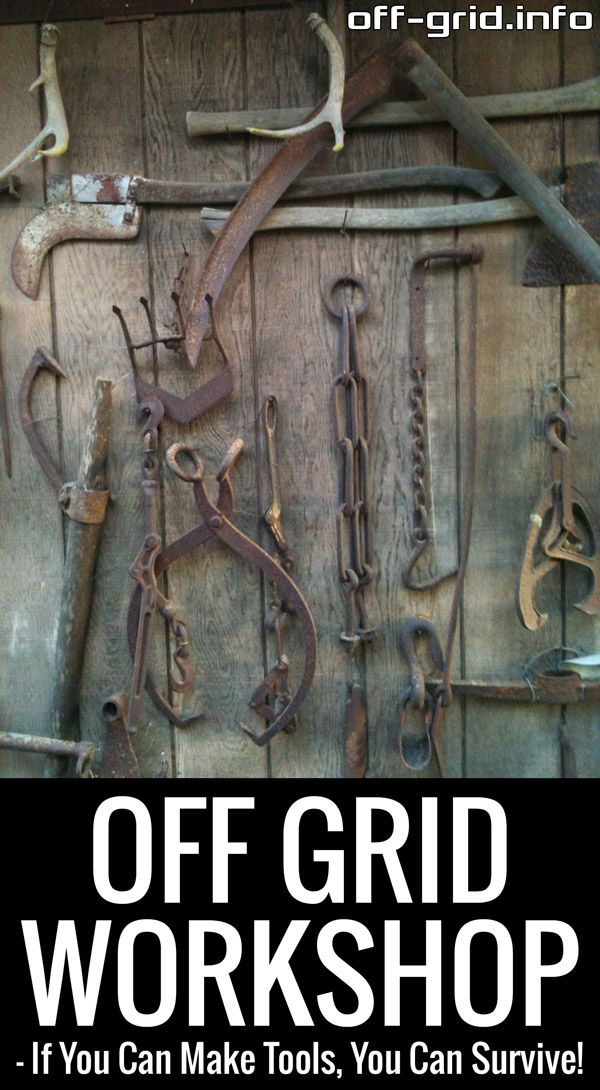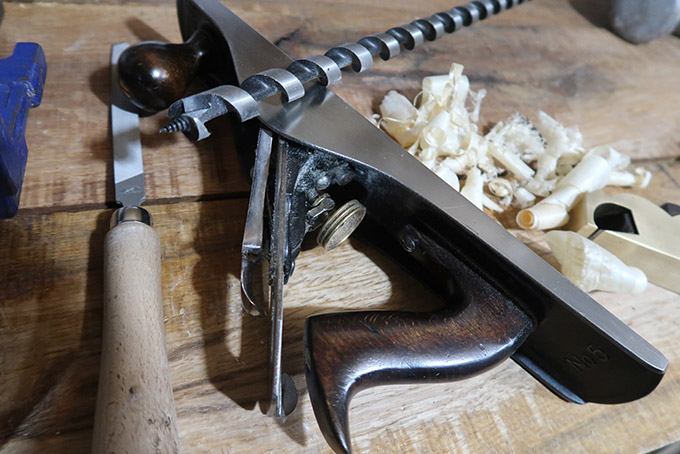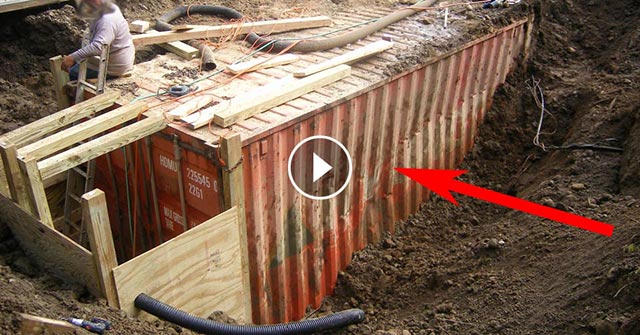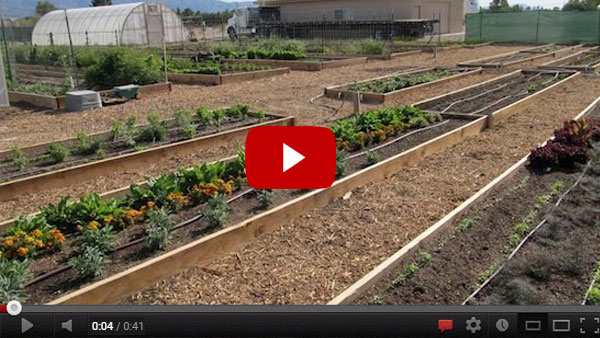Click Here To Join Our Telegram Channel for FREE daily tutorials!

OFF GRID / SURVIVAL WORKSHOP – Image © off-grid.info
The Best “Survival Workshop” I Ever Saw…

… belonged to an old-timer I knew from my California days. He owned a small 5-acre horse ranch and was around 80 when I knew him; sadly he’s gone now. He was really a legend. Everybody seemed to know him and the stories of his adventures and deeds appeared to be endless – as was his razor-sharp sense of humor: He’d look you up and down and size up whether you were made of the right stuff before you had even opened your mouth, and he would make endless playful jokes at everyone around. You had to be able to let it roll right off you, and to think fast to come up with a good answer.
His whole demeanour was that of a pioneer; a true “last survivor of the good old days”. He seemed to do everything himself. He’d been self-reliant his entire life and it didn’t seem like there was anything practical he wasn’t capable of. He could hunt, shoot, fish, ride, farm, fabricate… if he needed something, or needed to repair something, his first approach was always to see if he could make it or fix it himself in his old workshop. Going to buy something was a last resort.
The amount of tools and bits and pieces he had piled up in that workshop was spectacular. Nobody knew where anything was, except him – and he could find anything of course. The photo of the rusty antique tool collection hanging from the wooden wall of his old workshop was taken by me at his place, around 10 years ago. How many of these old tools do you recognize and would you know what to do with?
Skills Are More Valuable Than “Stuff”…
While so many people are trying to “shop their way to survival”, you need to think deeper than this. Long term survival is not just about piling up the biggest mountain of stuff you could possibly accumulate. This is the big mistake so many wannabe survivalists make. It’s a “habitual consumer” trait that has been trained into us by the modern world: “I like survivalism, so I will buy it off the shelf”.
Survival supplies are valuable, for sure, and can get you through a temporary crisis – but total reliance on them is a mistake. First of all, no matter how big a supply of something you pile up, it will run out at some point.

Supplies are temporary. Your abilities, your health (God willing) and your well-made tools are the only things that will last a lifetime.
Bear in mind also that the more supplies you have, the more effort and expense is required to maintain your store. If you were to stack up the amount of food a family eats in a year, you would be staggered by just how much space is needed to store that.
And then what happens at the end of that year, or two years, or five years? Sooner or later, only those who know how to provide for themselves will survive.
You’ll need to grow food – but if there are no shops… where will you get the tools to dig the garden? Could you make a bow and arrows entirely from natural materials you harvested yourself?
You can easily see that having the ability to make tools (and repair things) is going to be key to survival in the end. Anything that you don’t know how to make or repair, you are going to have to do without soon enough. So for true self-reliance, you might as well start by acquiring the incredibly valuable skills needed to make your own tools and put your own survival workshop together.
The Farm Workshop:

When most people think of a farm, they think of fields, animal shelters, barns and the various types of farming equipment – tractors, grain harvesters and so on. It’s not immediately obvious that almost all farms have their own workshop – but they do. Typically a farm workshop will contain the equipment needed to maintain and repair tractors and other agricultural machinery, as well as estate maintenance tools and the tools for working with whatever animals the farm has. So you will see welding equipment, mechanic’s toolkit, workbench, fencing tools and supplies, angle grinder, lifting tackle, blacksmithing equipment, chainsaws / axes / bow saws, brush cutters and so on.
A farm / ranch workshop is an ideal starting point to give you inspiration and practical ideas for your survival workshop…
Off Grid Workshop Power:
If you are thinking off-grid then you have the added consideration of generating and storing your own electricity for power tools, so as to be able to continue to operate independently of the grid.
Most power tools that run from the typical 110v (USA) or 220v (Europe) mains power supply, will run from a 3000W inverter. Pure sine wave is recommended as modified sine can cause degradation to some equipment. Higher powered tools can have quite a power kick on startup – especially compressors. Although an inverter may be rated at 3000W, you won’t get anywhere near that unless your cabling is heavy duty and your batteries are up to the job. A band saw is a key component of a wood workshop – but bigger electrical machinery such as band saws and lathes that require a dedicated high power circuit are going to be a more significant challenge for off grid power. You’re into complex electrical installations that would certainly require qualified installation.
There are always alternatives, however. I’ve seen various trailer mounted portable sawmills that operate with gasoline engines. Then there is of course generator power and PTO (power take off) from tractors.
Going even further, an interesting line of research would be how sawmills used to operate prior to electricity: Steam power! Here’s a simply fantastic video I found of a working steam-powered sawmill (I got lost in this):
Tools That Make Tools:
Having the equipment required to work with the most common materials is going to be essential. So this is a good starting point of consideration: Your primary tools are going to be the “tools that make tools”. You will also need to be able to sharpen, maintain and repair existing tools. Do you know what types of wood are best suited for tool handles? For spindles? Do you know how to temper steel to make steel that cuts steel?
Low Tech:
If you are really thinking “low tech / old school” and envisaging a survival workshop without electricity or any liquid / gas fuels, then your survival workshop becomes simpler in some ways. It will typically require blacksmithing, hand metalwork and hand woodwork tools, plus some tools enabling you to work with the most common additional materials – including stone, fabrics, leather, clay / tile / brick and perhaps glass. Drawing and design tools will be valuable too – as anything complex you fabricate you will most likely want to design first. Without computer aided design, you’re back to pencils, compasses, protractor and ruler. How’s your memory of geometry these days?

Hand Tools. Image © off-grid.info
Animal Power:
Before the advent of the tractor and modern farm machinery, animals were used for their power and endurance – with heavy horses and oxen of course being used for ploughing, tilling and the various other tasks now done by tractors. Working with horses will mean saddlery, wheelmaking, blacksmithing and more.
High Tech Survivalism?
If you are thinking in more modern terms (and have the inclination) then you might include the facilities to work on electronics. Even if all the world’s centralized systems ground to a halt tomorrow, it’s highly improbable that electronic items are going to disappear – especially now that solar panels are widespread.
If the centralized supply chain, which has certainly been showing some cracks of late, were to fall apart entirely and be disrupted long term, then those with the ability to repair electronics are logically going to be the last who are able to use them. In the absence of the ability to “just buy a new one on Amazon”, the role of the repairer is going to be in significantly higher demand than it is currently. I think electronics repair should certainly be included in any list of post-apocalypse trades.
What about computer aided design and 3D printing? I’ve never come across an off-grid workshop that can manufacture 3D-printed or sintered parts – and some survivalists will sneer at such “modernism”; however the potential value of such facilities to a larger community ought to be obvious.
All interesting food for thought. I’d suggest however to start simple and get the basics down: Learn metalwork, woodwork, leatherwork and stonework – acquiring the knowledge and materials to fabricate, maintain and sharpen the hand tools that make these possible.
Starting From “Nothing” (The Ultimate In Self Reliance):
I think the creation of a survival workshop starting absolutely from nothing would be a wonderful, challenging and highly educational exercise. You would have to learn to smelt your own metals; harvest, season and work wood, create greater precision from lesser precision… The skills and ingenuity you would develop would in my view be some of the best survival assets you could have. Imagine making your first chisel, your first drill, your first wheel and axle, your first workbench, wood-turning lathe…
You will quickly learn that even simple objects we take for granted in the modern world – such as a wheel nut for a bicycle or a cast-iron drain cover – require serious skills and knowledge to replicate successfully. But the rewards are immense.
Check out this man’s work – he built his own bandsaw, lathe and much else using recycled components he picked up for free:
Final note of course, take safety precautions. No matter how low-tech your workshop, I wouldn’t skimp on eye protection, ear protection, a sturdy pair of work gloves and everything else that you need to stay safe. Also, if you are dismantling old electronics, use ventilation systems when desoldering (lead fumes) and take care with old capacitors (toxic “forever chemicals” in the fluids) to dispose of them correctly and wear protective gloves. Don’t get that stuff on your hands.

This Crazy Off Grid Device Literally Makes Drinkable Water From Fresh Air:
According to NASA, the U.S. is expecting a 100-YEAR LONG MEGADROUGHT.
It's already begun. Ask the farmers in California. They know.
Every survivalist knows that water is of critical importance. You NEED an independent water source that you can count on!
As an interesting "survival rehearsal" - imagine that you turned the tap on right now and nothing came out. How long would you last?
But what if there was another water source literally hidden in plain sight. That's right, I'm talking about the atmosphere!
The amazing thing about getting water from the natural moisture in the air... is that it is ALWAYS available.
This gives you real water security!
Learn more about how to tap into "Nature's secret water reservoir" and stay hydrated when TSHTF!
Watch the video:
� What Tinnitus Does To Your Brain Cells (And How To Stop It)
After 47 years of studies and countless brain scans done on more than 2,400 tinnitus patients, scientists at the MIT Institute found that in a shocking 96% of cases, tinnitus was actually shrinking their brain cells.
As it turns out, tinnitus and brain health are strongly linked.
Even more interesting: The reason why top army officials are not deaf after decades of hearing machine guns, bombs going off and helicopter noises...
Is because they are using something called "the wire method", a simple protocol inspired by a classified surgery on deaf people from the 1950s...
Most People Don't Have The Guts To Try This:
An amazing discovery in an abandoned house in Austin, Texas: A lost book of amazing survival knowledge, believed to have been long vanished to history, has been found in a dusty drawer in the house which belonged to a guy named Claude Davis.
Remember... back in those days, there was no electricity... no refrigerators... no law enforcement... and certainly no grocery store or supermarkets... Some of these exceptional skills are hundreds of years of old and they were learned the hard way by the early pioneers.
>> Click here to find out about them now
We've lost to history so much survival knowledge that we've become clueless compared to what our great grandfathers did or built on a daily basis to sustain their families.
Neighbors said that for the last couple of years Claude has tried to unearth and learn the forgotten ways of our great-grandparents and claimed to have found a secret of gargantuan proportions. A secret that he is about to reveal together with 3 old teachings that will change everything you think you know about preparedness:
>> Click Here To Watch The Video <<
What REALLY Happens When You Bury a Shipping Container? (Hint: It's A Bit Crazy...)
Shipping containers are all the rage - but if you are thinking about buying one, you MUST watch this video first:
Do not, I repeat do NOT do what these lunatics did! Can you spot the "fatal mistake" they made?
There's a general belief that if you bury a shipping container you can create an awesome root cellar / storm shelter / survival bunker.
But is a shipping container strong enough to handle the pressure?
Watch the video to see what happens:
What Really Happens When You Bury a Shipping Container? (Click To Watch Video)

I Can't Help Showing This Off:
If you haven't heard of Claude Davis yet do yourself a huge favor and watch this video.
One of the smartest guys I ever had the pleasure of meeting, Claude set-up a unique prepping system that changed his life forever.
I already tried it myself and let me tell... you I was completely blown away... His surprising tactics could make your life easier and give you the peace of mind you deserve.
Don't just take my word for it... watch his short video and decide for yourself.
>> Click Here To Watch The Video <<

More Off-Grid And Survival Resources:












